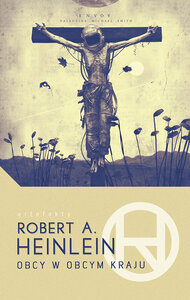Take a photo of a barcode or cover
Put it down then didn’t bounce back.
Stranger in a Strange Land is mostly about a guy named Jubal who, in his 80s, becomes the surrogate father to Mike, a man raised by Martians. The first 60% of the book is more or less a legal adventure where Jubal tries to assure Mike's personal freedoms.
Things I liked:
- Large focus on the humans and almost no focus on the Martians, instead feeling their culture via a the human they raised.
- The linguistic notion that the powers of Martians is something comprehendible only by learning their language, and thus opening up thought in a way English can't manage.
- The legal shenanigans that make up the majority of the book.
- Fair Witnesses, which are people trained to watched and memorize every detail of their situation like a computer on record, so that they may give fair testimony to it later.
- The way in which some characters evolve (the Jill/Dawn transformation was interesting).
Things I didn't like:
- The super outdated views on gender.
- The super outdated same-sex relationships.
- The fact that 50% of the book is comprised of rants and monologues Jubal gives other people, as if he were the wisest person on the planet.
- The fact tat Jubal is confirmed to be the wisest person on the planet.
- The extremely patchy philosophy of the Martian Sex Cult. (They sleep with each other to know each other perfectly no matter who... but where do family members come in? And why is gay-ness still wrongness? And how does any of this truly make people wise?)
- Long stretches of dialogue followed by the other character just saying "huh?".
- The word "grok" used to the point of meaninglessness.
Overall it was a good, fun book. There were parts that made me feel like the author lost track of what he wanted to happen in the book so instead just started rambling about his personal opinions on things. I read the long version of this book, and I can totally see the value of the short one.
Things I liked:
- Large focus on the humans and almost no focus on the Martians, instead feeling their culture via a the human they raised.
- The linguistic notion that the powers of Martians is something comprehendible only by learning their language, and thus opening up thought in a way English can't manage.
- The legal shenanigans that make up the majority of the book.
- Fair Witnesses, which are people trained to watched and memorize every detail of their situation like a computer on record, so that they may give fair testimony to it later.
- The way in which some characters evolve (the Jill/Dawn transformation was interesting).
Things I didn't like:
- The super outdated views on gender.
- The super outdated same-sex relationships.
- The fact that 50% of the book is comprised of rants and monologues Jubal gives other people, as if he were the wisest person on the planet.
- The fact tat Jubal is confirmed to be the wisest person on the planet.
- The extremely patchy philosophy of the Martian Sex Cult. (They sleep with each other to know each other perfectly no matter who... but where do family members come in? And why is gay-ness still wrongness? And how does any of this truly make people wise?)
- Long stretches of dialogue followed by the other character just saying "huh?".
- The word "grok" used to the point of meaninglessness.
Overall it was a good, fun book. There were parts that made me feel like the author lost track of what he wanted to happen in the book so instead just started rambling about his personal opinions on things. I read the long version of this book, and I can totally see the value of the short one.
medium-paced
Plot or Character Driven:
Character
Strong character development:
Complicated
Loveable characters:
Complicated
Diverse cast of characters:
No
Flaws of characters a main focus:
No
Fascinating and thoughtful, this sci-fi story follows a Martian after he arrives on a near-future earth and attempts to learn human culture, while simultaneously coming into his own mystifying powers. Heinlein examines (and picks apart) notions of organized religion and capitalism, while favorably depicting communal families, and casual and group sex. A good read with charming characters (Jubul is my favorite), just brace yourself for some of the casual misogyny and racism that often appears in the fiction of this era (early 1960s).
adventurous
challenging
emotional
informative
lighthearted
tense
medium-paced
Plot or Character Driven:
Character
Strong character development:
Yes
Loveable characters:
Yes
Diverse cast of characters:
Yes
Flaws of characters a main focus:
No
offensively and sexist and homophobic without any need and beyond the point that being from mid century would excuse. but had some interesting points
The amount that the logic of Martian language and interaction is described leaves me not able to fully understand the system, but I think that's intentional. Felt like you could only ever understand 80%, but that it wasn't always the same 80%.
Mike becoming passionately religious makes sense, he's basically a super intelligent baby, which in human terms I think would be most closely compared to a teenager who has finally gained the ability to understand a complex way of rationalizing their purpose.
Though I enjoyed trying to guess at Mike's ultimate goals, I do feel that the legal/bureacratic implications of his inheritance, given a lot of importance early in the book gets swept under the rug.
Believe the only time Mike clearly says he thinks "humans do X better than Martians" is regarding sexuality.
Mike becoming passionately religious makes sense, he's basically a super intelligent baby, which in human terms I think would be most closely compared to a teenager who has finally gained the ability to understand a complex way of rationalizing their purpose.
Though I enjoyed trying to guess at Mike's ultimate goals, I do feel that the legal/bureacratic implications of his inheritance, given a lot of importance early in the book gets swept under the rug.
Believe the only time Mike clearly says he thinks "humans do X better than Martians" is regarding sexuality.
I enjoyed this much more than I expected. Even though it's clearly sci-fi — we have a futuristic Earth and an established Martian race — Heinlein establishes the outlines of the world subtly and doesn't spend too much time dwelling on futuristic technology. And he envisions not just technological shifts but cultural ones — I loved the idea of a Fair Witness who can testify impartially to any event that happens in their presence while they're officially "cloaked."
At the heart of this story is Valentine Michael ("Mike") Smith, raised on Mars among Martians but biologically human, who is brought back to Earth. Although the book does spend time delving into philosophy (sometimes a little too much), this is balanced by the straightforward action pieces — kidnapping, government cover-up, officials attempting to "disappear" people and getting literally disappeared themselves — at least in the first part of the book. We see how arbitrary or odd many of our cultural customs are through the lens of Mike, who doesn't "grok" things like religion, fiction, and love. And then, when he does mature enough to fully understand these concepts, he is able to capitalize on them in a way that is both admirable and frightening. Heinlein has him walk a careful line between a Christ figure and a classic cult leader so that the reader isn't sure what to think.
At the heart of the book is the character of Jubal Harshaw, who is one of my new favorite fictional characters. He's old, incorrigible, cantankerous, and very, very wise and loving toward others in his own way. I don't necessarily agree with every one of his views, but I enjoyed hearing them and especially enjoyed watching the way he handled difficult situations throughout the book. It could be argued that he is sexist in the way he treats the three women in his household, but it's made clear from the first scene that he has no real power over them and they're there because they enjoy being there, plus he has no interest in them sexually nor does he have any interest in controlling their sex lives.
There's definitely more to get out of this book than I could grasp in a first reading, and I would need to have a better handle on exactly what was going on in 1961 to fully appreciate the place that this book had in the culture at the time. There were certainly parts that rubbed me the wrong way (one of the women makes a comment that 9 out of 10 rapes are at least partly the woman's fault) and the pacing was a bit uneven at times, plus there are some odd and seemingly unnecessary scenes that take place in "heaven" and seem to exist mostly for laughs. Overall, though, I ended up really enjoying this read and am glad that I read it.
At the heart of this story is Valentine Michael ("Mike") Smith, raised on Mars among Martians but biologically human, who is brought back to Earth. Although the book does spend time delving into philosophy (sometimes a little too much), this is balanced by the straightforward action pieces — kidnapping, government cover-up, officials attempting to "disappear" people and getting literally disappeared themselves — at least in the first part of the book. We see how arbitrary or odd many of our cultural customs are through the lens of Mike, who doesn't "grok" things like religion, fiction, and love. And then, when he does mature enough to fully understand these concepts, he is able to capitalize on them in a way that is both admirable and frightening. Heinlein has him walk a careful line between a Christ figure and a classic cult leader so that the reader isn't sure what to think.
At the heart of the book is the character of Jubal Harshaw, who is one of my new favorite fictional characters. He's old, incorrigible, cantankerous, and very, very wise and loving toward others in his own way. I don't necessarily agree with every one of his views, but I enjoyed hearing them and especially enjoyed watching the way he handled difficult situations throughout the book. It could be argued that he is sexist in the way he treats the three women in his household, but it's made clear from the first scene that he has no real power over them and they're there because they enjoy being there, plus he has no interest in them sexually nor does he have any interest in controlling their sex lives.
There's definitely more to get out of this book than I could grasp in a first reading, and I would need to have a better handle on exactly what was going on in 1961 to fully appreciate the place that this book had in the culture at the time. There were certainly parts that rubbed me the wrong way (one of the women makes a comment that 9 out of 10 rapes are at least partly the woman's fault) and the pacing was a bit uneven at times, plus there are some odd and seemingly unnecessary scenes that take place in "heaven" and seem to exist mostly for laughs. Overall, though, I ended up really enjoying this read and am glad that I read it.




